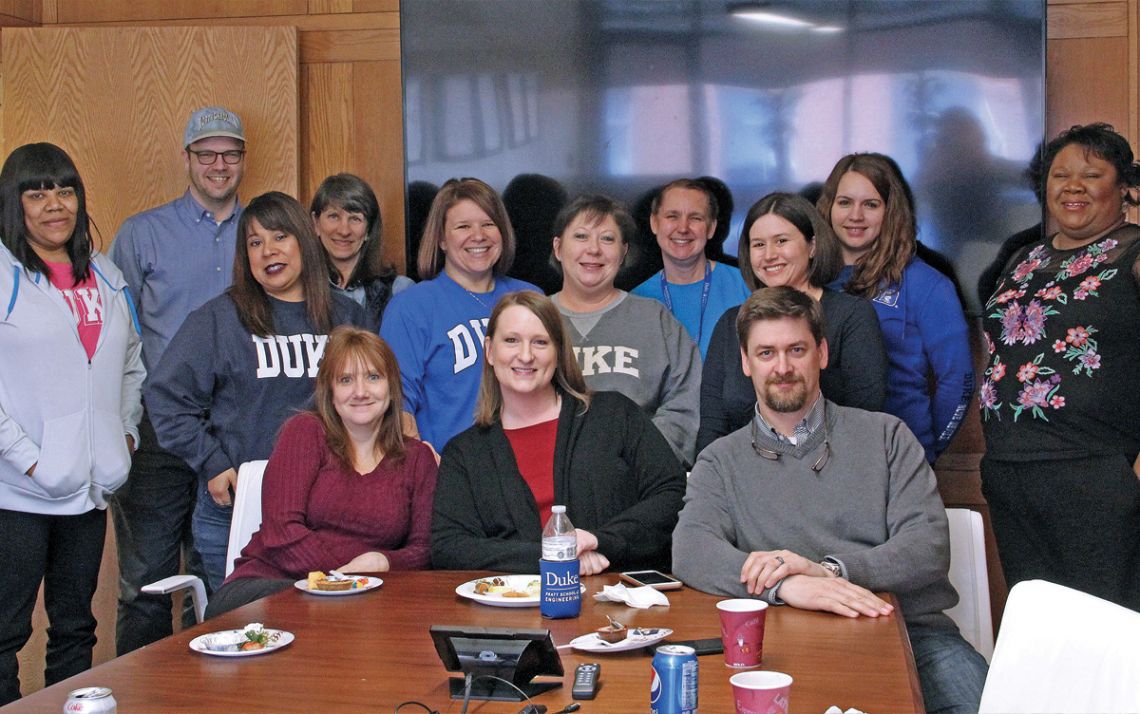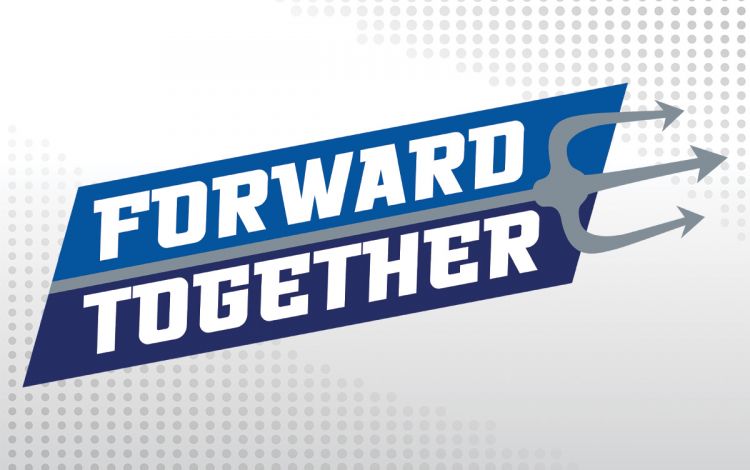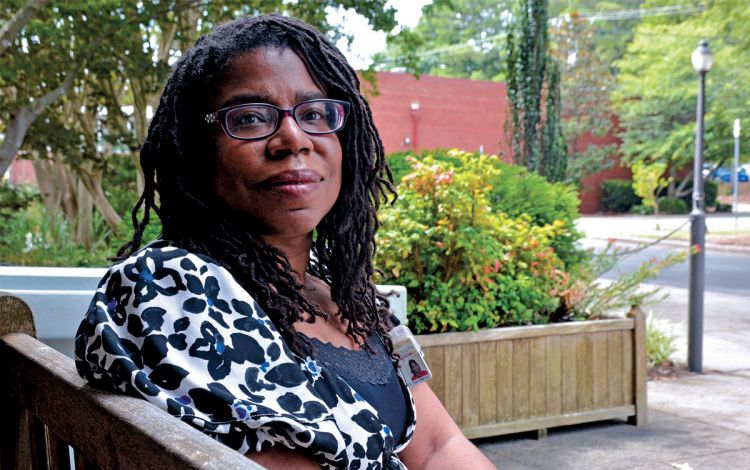Forward Together: The Ingredients of a Strong Work Culture
Respect, encouragement, inclusion, and camaraderie contribute to a positive climate

On a Wednesday in late March, with the Duke men’s basketball team midway through its journey to the 2022 Final Four, around a dozen staff members from the Pratt School of Engineering gathered in a conference room to talk hoops and share snacks.
 The event revived Pratt’s pre-pandemic tradition of lunchtime “tailgates” in anticipation of major sporting events. This one, which featured mini tacos and cakes and amateur analysis of the Blue Devils’ chances, allowed colleagues to bond.
The event revived Pratt’s pre-pandemic tradition of lunchtime “tailgates” in anticipation of major sporting events. This one, which featured mini tacos and cakes and amateur analysis of the Blue Devils’ chances, allowed colleagues to bond.
Jim Morris, who had been hired as the building coordinator at Pratt roughly a year earlier, had mostly spoken with colleagues about ventilation hoods, burned-out lights, or room temperatures.
“I got to actually talk to people about what they did and what I did,” Morris said. “It was also fun to get to know people and understand where they’re coming from.”
Hemant Kakkar, an assistant professor at Duke’s Fuqua School of Business who studies management and organization, says a strong work culture forms when employees feel connected to one another and their employer. When that culture develops it leads to a more motivated and resilient workforce.
 “You want to create a core identity, a sense that we are part of something together,” Kakkar said. “What that culture does is make people accountable to what they are doing. It gives them a sense of meaning, a sense of purpose, a sense that we are all in this together. When these come together, we find meaning in our work.”
“You want to create a core identity, a sense that we are part of something together,” Kakkar said. “What that culture does is make people accountable to what they are doing. It gives them a sense of meaning, a sense of purpose, a sense that we are all in this together. When these come together, we find meaning in our work.”
In its 2022 Global Talent Trends report, “The Reinvention of Company Culture,” LinkedIn found that 40 percent of job seekers list “colleagues and culture” as a top priority when choosing a new job. Among the top ways employers can improve workplace culture are embracing flexible work arrangements, building a diverse and inclusive climate, and encouraging professional development.
At Duke, these human-centered attributes are taking root.
More Than an Employee
 In July of 2020, when Elissa Nickolopoulos and her fellow licensed clinical social workers at the Outpatient Clinic on North Roxboro Street returned to work in-person, she had plenty to get used to.
In July of 2020, when Elissa Nickolopoulos and her fellow licensed clinical social workers at the Outpatient Clinic on North Roxboro Street returned to work in-person, she had plenty to get used to.
She had to figure out how to provide support to patients with mental and behavioral health concerns during a pandemic, and she was also adjusting to life as a mother.
With a three-month-old daughter at home, Nickolopoulos’ return to work complicated the balance between her work and family roles. But over the past two years, she has been grateful that her managers and colleagues provided the flexibility she’s needed to take care of both sides of her life.
Nickolopoulos said that when her daughter has had a sick day, or when daycare is closed due to COVID outbreaks, her team encouraged her to work from home. To Nickolopoulos, the acts are a sign that her team values the whole self, not just the work.
“We all have lives outside of work and sometimes we need to step away,” Nickolopoulos said. “Our department encourages us to do that.”
Mutual Respect
 Whether with the small team she leads, or among colleagues in her larger unit, Duke University Health System Associate Compliance Officer Felice McNair knows that for teams to be successful, members must find common ground.
Whether with the small team she leads, or among colleagues in her larger unit, Duke University Health System Associate Compliance Officer Felice McNair knows that for teams to be successful, members must find common ground.
In recent years, amid difficult conversations about race, politics, and the pandemic, the ability to forge connections on remote teams hasn’t been easy. But McNair said she’s been encouraged by how colleagues from different backgrounds are willing to put in work to maintain a climate of respect.
“We’re getting there,” said McNair, who joined Duke in 1997. “We’re moving forward.”
Diversity and inclusion are listed in the LinkedIn report among the top areas to invest to improve culture. For McNair, building an open and inclusive atmosphere has been a team effort involving both her department and close colleagues on the Professional Compliance Team. She has found helpful insights on communication and empathetic leadership from courses through Duke’s Learning & Organization Development (L&OD), the health system’s “Moments to Movement” initiative against racism in all forms, and more.
She’s used lessons to inform productive conversations with her team about topics such as implicit bias and microaggressions.
“Workplace culture is showing respect to others in how they feel, beliefs and even how they express their thoughts,” she said. “We should be willing to listen and learn. Allow everyone to feel that they have a space.”
Climate of Togetherness
 Before the pandemic, Irina Mokrova’s weekly Thursday team meetings were important, but not ironclad. If someone on the School of Medicine’s five-person Office of Research Development team had an urgent scheduling conflict, the 90-minute session might get called off.
Before the pandemic, Irina Mokrova’s weekly Thursday team meetings were important, but not ironclad. If someone on the School of Medicine’s five-person Office of Research Development team had an urgent scheduling conflict, the 90-minute session might get called off.
Since going hybrid in March 2020, the now-Zoom-based meetings have become central to the team’s supportive culture. Led by Associate Dean Joanna Downer, the virtual gatherings feature discussions of life away from work where both happy moments and struggles are shared.
“We talk about our lives like humans,” said Mokrova, a senior research development associate. “We’re not just talking work; we’re talking about what’s really happening with us.”
As teams work at maintaining connections, for Mokrova’s group, honest and open meetings have strengthened personal and professional bonds.
When conversation turns to shepherding faculty ideas through the grant application process, discussions of deadlines and workflows also include talk of team members’ bandwidth and balance, setting a tone where mention of hurdles is invariably followed by team members asking how they can help.
“I have worked at places where the culture was that you have your job, and you just have to do it,” Mokrova said. “For us, supporting each other is very important.”
As the post-pandemic work landscape evolves, Working@Duke will share stories of how individuals and schools, department and units are building a positive culture at Duke as part of a new series, Forward Together. Tell us your story.